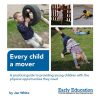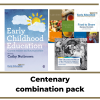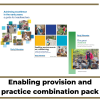Teaching in reception for the first time
It could be argued that teachers who move into teaching reception for the first time, face the same challenges as the children themselves as they start in reception.
Transition for children from the Reception class into Year 1 in England remains fraught with challenge. The absence of national principled guidance makes this age group particularly vulnerable to inappropriate expectations and targets. Since the introduction of the National Curriculum the pedagogical direction of schools has been increasingly steered by external frameworks and guidance viewing KS1 as the start of primary school rather than the end of the early years. The coalition government in 2010 dismantled plans for a national programme advocating that schools should “build on” the foundation stage (QCDA 2010), replacing this with a mantra of school readiness (DfE 2010) and reaching “end points” (Ofsted 2019). Not enough schools have been able to make a stand against this tide as, too often, senior leaders have lacked the knowledge to make informed choices about an appropriate pedagogy for their KS1 children.
There are many contributory factors to tensions between pedagogy in the early years and in KS1. Historically the principles and pedagogies underpinning the EYFS and the National Curriculum and national strategies for literacy and numeracy were never aligned (Fisher 2011). Messages about practice and the role of the teacher were conflicting, with Reception teachers being encouraged to engage in and support child-led learning whilst the National Curriculum and national strategies required KS1 teachers to lead learning in order to fulfil the stipulated objectives. Those schools where changes in pedagogy were seen as “too abrupt” (Ofsted 2004) were often led by headteachers without sufficient experience of teaching in the early years to enable them to appreciate the pressure such a shift in pedagogy would have on their children – and indeed on their teachers.
Primary headship appointments have long reflected the impact of the national programme throughout England in the late 1980s/90s, amalgamating infant and junior schools into all-through primary schools (Richards 1999). Many headteachers of these new primary schools were previously the heads of the junior school, and had no experience of teaching children younger than Year 3. Inevitably perhaps, practices were introduced and initiatives adopted that may well have been suitable and appropriate for children in the junior school, but proved far too formal and restricting for children who had just enjoyed the pedagogy of the infants. This gap in professional knowledge was recognised in some local authorities who put on courses for those wishing to apply for headship but without relevant or adequate experience. But this was by no means universal, and as data became increasingly more important in headship interviews than knowledge of child development, those without sufficient experience and expertise not only slipped through the net but were actively encouraged into post.
Of all the aspects of pedagogy that most challenge those without early years experience, it is the place of play. Too many of those in positions of responsibility in our primary schools still regard play as trivial and a distraction from the real business of schooling – certainly by the time children get into KS1. Yet the recent national guidance from Scotland “Realising the Ambition” (Scottish Government 2020) goes as far as to state: “transition will likely be smoother for the child if play remains and continues as the main vehicle for their early learning in Primary 1 and beyond”. My recent research into the place of play in KS1 classrooms (Fisher 2020) demonstrates, in all manner of ways, that this is the case. The book is full of teacher accounts of Year 1 children responding positively to a learning day that builds on the best of their experiences in Reception. Learning days that encourage children’s interests and weave these into more formal adult-led teaching; that prioritise play in order for children to make choices, use initiative and be creative; that offer time and space for innovation as well as consolidation – of what teachers have taught – but in children’s own time and in their own ways.
This research also revealed the impact of headteachers on the development of play-based pedagogy in KS1. Of 537 surveys returned by KS1 teachers, 397 were from teachers wanting to work in play-based ways, but who faced barriers in doing so. The three reasons most frequently cited were:
But I also received surveys from those excited and empowered by headteachers supporting play-based approaches. In order to discover what motivated these headteachers, I interviewed 11 of the headteachers who their teachers identified as committed to a developmentally sensitive transition into KS1. The first issue that emerged from these interviews was trust.
(HT 10) I cannot be expert in everything. But I rely on those who do have the expertise and trust them to develop their pedagogy, keeping me informed so I can be a valuable sounding board. I was only convinced it could work because I trusted the knowledge and understanding of those I entrusted with the approach and then saw the evidence for myself.
Whilst all the headteachers acknowledged that they wanted and needed evidence that this approach “worked”, they were prepared to give it time without losing faith when things went wrong or progress stalled. The headteachers spoke in different ways about being convinced by the progress the children were making and their enthusiastic engagement in learning. Their clear message to more sceptical colleagues was to see play as a rich, motivating learning opportunity rather than a distraction from learning and that, in doing so, they might also see standards in their schools rise.
(HT 3) This is no way depresses standards! People who think that don’t understand what opportunities play offers children. Play means that children are encouraged to be independent thinkers; children who want to learn because it’s often play-based are more motivated; they are motivated to do their own learning or to practise something they’ve been taught in their own time. I have not seen anything since introducing this approach that says to me that standards are falling. Why would they?
Despite these positive messages, the research outcomes overall confirm years of anecdotal reports that the support of headteachers and senior leaders is critical to the development of an appropriate pedagogy in KS1, and that too many teachers struggle to adopt this approach in the face of opposition from school leaders who sometimes have little or no personal experience of teaching in the early years. One headteacher interviewed said:
(HT 8) One of the greatest pressures at the moment is coming from other heads. I see it when we are involved in peer monitoring or learning walks around other people’s schools. A head will say “Haven’t your children got books for (naming about 6 things)” and then the less confident head says, “Oh…should we?” and then goes back to their school and demands their staff do the same. The head who asked the question has made a decision for their school based on anxiety rather than principle or what’s best for outcomes learning rather than learning. They then put the fear of god into other heads, and their staff and children are having their lives changed because of one ill-informed statement from one ill-informed head. It’s a culture of fear.
These statements are powerful. In the new edition of Moving On to KS1 (Fisher 2020) I share more of these messages from headteachers to headteachers in an attempt to inspire those with less knowledge, less experience and less courage to embrace a way of working that is so demonstrably powerful and beneficial for children and teachers alike. However, whilst inspired by these headteachers, I am also left with considerable concerns for those teachers in schools where headteachers are proving the barrier to development in the early years as well as KS1. I believe that there are too many instances where a lack of experience leads to a lack of knowledge which, in turn, leads to a lack of vision – for what is appropriate, for what is meaningful, for what is inspiring for our KS1 learners. What we need is greater understanding from politicians, policy makers and educational leaders of the need for the education of children in England, aged birth to 7, to be seen as a developmental continuum. To produce national guidelines outlining a pedagogy focusing on “children’s healthy all-round development (physical, emotional, social and cognitive” (Palmer 2020) and not to remain narrowly focussed on outcomes in literacy and mathematics. To find that “pedagogical meeting place” (Moss 2012) between early childhood education and compulsory schooling which might open up possibilities for all KS1 children to experience a developmentally sensitive pedagogy.
In order for this to be accelerated, I suggest there is an urgent need in England for all applicants for the headship of primary schools to have either early years experience or, if not, undertake an early years leadership qualification, similar to one currently provided in Scotland (Education Scotland). It is high time that English policy makers understood that if the early years of education is as profoundly important as they claim, that their policies need to acknowledge the central, critical and unique place of play in achieving the ambitious outcomes for learning and development we all want to see by the end of KS1.
This is an expanded version of an article written by Julie for Nursery World in January 2021.
Membership of Early Education is suitable for headteachers and leaders as well as early years practitioners and teachers, and is available from £10 a term for individuals or as a bulk membership for schools and settings.
Department for Education (2010). Review of Early Years Foundation Stage.
Education Scotland (2020). Leadership of Early Learning
Fisher, J. (2020). (2nd edn) Moving On to Key Stage 1, London: Open University Press.
Moss, P. (2012). Readiness, Partnership, a meeting Place? Some thoughts on the possible relationship between early childhood and compulsory education, Forum, Vol.54, No.3, 355-368.
Ofsted (2004). Transition from the Reception Year to Key Stage 1: an evaluation by HMI, London: Ofsted.
Ofsted (2019). School Inspection Handbook, Manchester: Ofsted.
Palmer, S. (ed) (2020). Play is the Way, Paisley, CCWB Press.
QCDA (Qualifications and Curriculum Development Agency) (2010). Building Bridges, Powerpoint presentation sent to all local authorities in England, London: QCDA.
Richards, C. (1999). Primary Education – at a Hinge in History, London: Falmer Press.
Scottish Government (2020). Realising the Ambition, Edinburgh: Scottish Government.
It could be argued that teachers who move into teaching reception for the first time, face the same challenges as the children themselves as they start in reception.
by Cathy Gunning Teaching in the early years is not easily definable. Early teaching and learning is about the process, the journey and the unique









Early Education
2 Victoria Square
St Albans
AL1 3TF
T: 01727 884925
E: office@early-education.org.uk